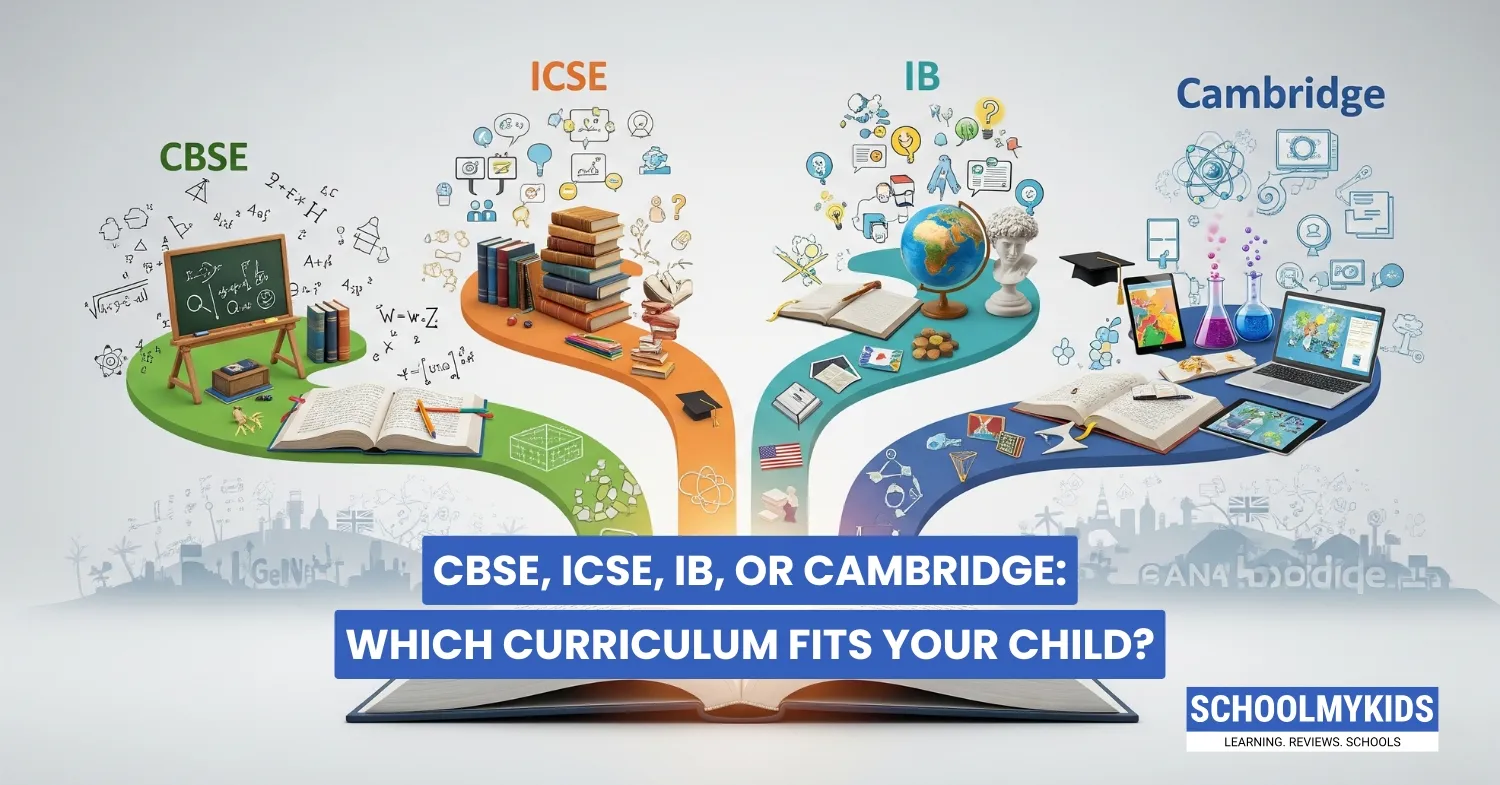If you’re a parent in India today, chances are you’ve already been overwhelmed by this question: Which board is best for my child, CBSE, ICSE, IB, or Cambridge?
It’s a real concern, because the board you choose doesn’t just decide what your child learns inside a classroom, but also how they think, what kind of opportunities they’ll have later, and how much pressure they’ll face during school years. The truth is, there’s no “perfect” board. Each has its own strengths, weaknesses, and suitability depending on your child and your family’s goals.
So let’s walk through them step by step, which will help you make a confident choice.
CBSE (Central Board of Secondary Education)
- Reach & Access: The most common board in India. More than 27,000 CBSE schools exist, making it easy if your family relocates. CBSE is also recognized by all Indian universities.
- Focus: Strong push on Science and Math; moderate attention on English and Social Science. Often prepares children for JEE, NEET, UPSC, and other national entrance exams.
- Exams: Largely objective, straightforward, and easier to score compared to others.
- Syllabus: Based on NCERT textbooks. Considered less bulky than ICSE, which reduces learning pressure somewhat.
- Affordability: Generally cheaper (both fees and books) compared to ICSE, IB, and Cambridge.
- Best suited for: Families planning higher education in India, especially competitive exams. Children who prefer structured learning with direct questions.
Parent Insight: CBSE is practical. It’s accessible, affordable, and straightforward. But it tends to focus more on rote memorization, so parents may need to encourage critical thinking at home.
ICSE (Indian Certificate of Secondary Education – under CISCE)
- Reach & Access: Around 2,700 schools in India. Less widespread compared to CBSE.
- Focus: Balanced approach like arts, sciences, languages, and math. Known for its excellent English language program and detailed subject coverage.
- Exams: Descriptive and analytical, requiring well-developed writing skills. Getting high marks is tougher than CBSE.
- Syllabus: Very detailed and broad. Children study more subjects, and practical projects carry weightage.
- Affordability: Higher school fees and resource costs than CBSE schools.
- Best suited for: Children excelling in language, arts, social sciences, or those whose parents are considering eventual education abroad.
Parent Insight: ICSE builds thorough subject understanding and strong communication skills. But it can be overwhelming for children who struggle with heavy, detailed syllabi.
Cambridge (IGCSE and A Levels)
- Reach & Access: 650+ schools in India use the Cambridge system. Recognition in 160+ countries.
- Focus: Offers flexibility with over 70 subjects, no rigid “stream” system. Encourages problem-solving, communication, and independent thinking.
- Exams: Very application-based: oral tests, coursework, written papers, and projects. Far less rote memorization.
- Syllabus: Global in approach, with international relevance (no local bias). Prepares for higher education abroad, though it is recognized by Indian universities as well.
- Affordability: Expensive, both in terms of school fees and exam costs. Limited availability compared to CBSE/ICSE.
- Best suited for: Globally inclined families, children planning to study in Europe/UK/US, or looking to develop a broad, creative learning style.
Parent Insight: Cambridge nurtures independent learners and globally aware minds. But it requires a higher level of commitment (time + money) from both the child and parents.
IB (International Baccalaureate)
- Reach & Access: 230+ IB schools in India. Globally accepted in 150+ countries. Mostly available in metro cities.
- Focus: A research-heavy, project-driven, and holistic curriculum. The IB Diploma Programme (Grades 11–12) is especially known for preparing students for world-leading universities.
- Exams: Continuous evaluation with essays, projects, portfolios, and presentations. Very little rote-based assessment, as everything is about critical thinking and real-world application.
- Syllabus: Requires students to study from six broad areas while also completing CAS (Creativity, Action, Service), TOK (Theory of Knowledge), and EE (Extended Essay – 4,000 words).
- Affordability: The costliest option among the four. Requires schools with specialized staff and training.
- Best suited for: Highly self-motivated students, families aiming for Ivy League or top universities abroad, and parents who can provide ongoing academic and emotional support.
Parent Insight: IB offers unmatched exposure but can be intense. It works wonders for curious, proactive learners but may overwhelm children who prefer structured, exam-centric learning.
Stress, Workload and Lifestyle Comparison
- CBSE: Moderate workload, more exam-driven. Focus is on getting results in competitive exams.
- ICSE: Heavier workload due to broader syllabus. More stressful for children who don’t enjoy detail.
- Cambridge: Moderate but requires independent study. Less about memory, more about application.
- IB: Most strict as projects, research essays, assignments, and presentations add pressure.
Recognition and Future Opportunities
- For Indian Universities: CBSE and ICSE are fully recognized and always align with entrance exam norms.
- For Abroad: IB and Cambridge are more popular with foreign universities, though ICSE is also recognized. CBSE is accepted globally, but it is less ideal for direct transition compared to IB/Cambridge.
Final Comparison Chart
| Board | Strengths | Challenges | Best Fit For |
| CBSE | Widely available, affordable, exam-aligned | Rote learning, less focus on creativity | Students aiming for JEE/NEET, Indian universities |
| ICSE | Strong English, balanced syllabus, deeper understanding | Broad syllabus, harder to score | Language/arts lovers, those considering abroad study |
| Cambridge | Flexible subjects, global recognition | High fees, fewer schools | Students aiming for UK/Europe/US, creative thinkers |
| IB | Most holistic, international reputation | Extremely rigorous, costly | Self-motivated learners, plans for global universities |
Conclusion
Choosing the right curriculum is not about comparing “which board is harder, easier, or better.” It’s about asking:
- Where do I see my child studying after school: India or abroad?
- Does my child love structured textbook learning or open-ended exploration?
- What kind of learning environment will keep my child confident and motivated?
At the end of the day, the board is just one part of the puzzle. The quality of the school, its teachers, and how you support your child at home often make the biggest difference.
Choose the board that fits your child’s pace, interests, and future goals, not what society says is the “best.”









Be the first one to comment on this story.